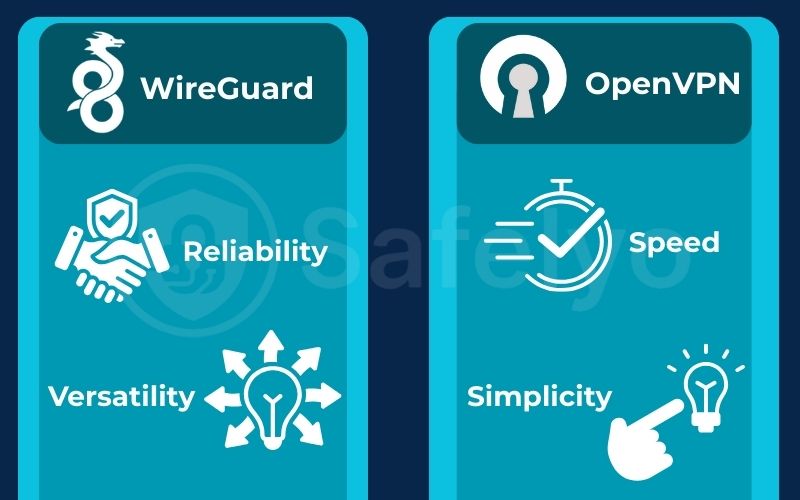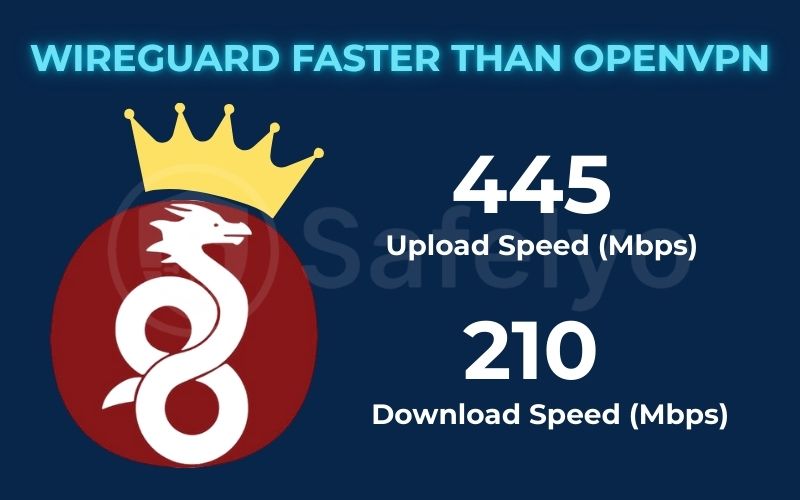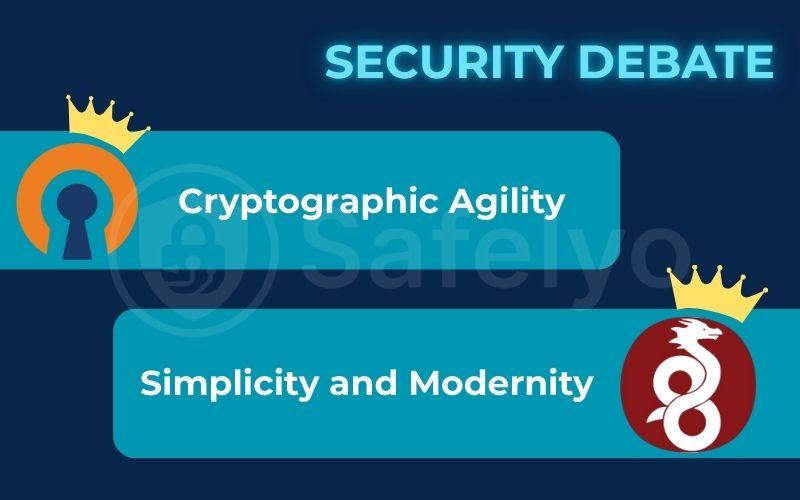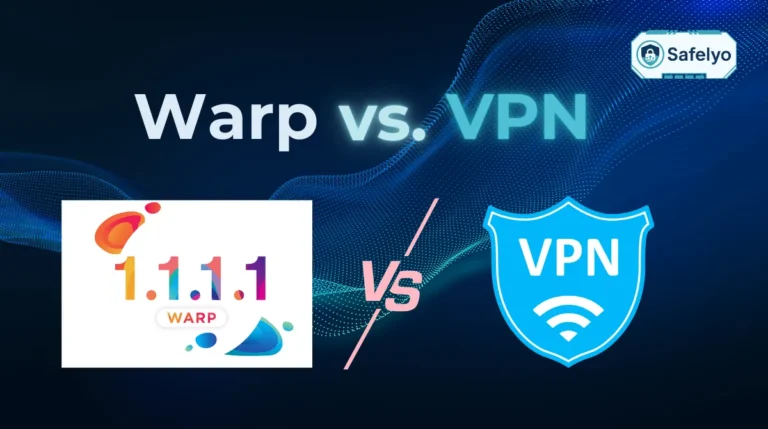When you dive into your VPN’s settings, you’ll find a critical choice: Which protocol should you use? Think of a VPN protocol as the engine of your connection – it determines your speed, security, and stability. For years, OpenVPN was the undisputed king, a powerful and reliable engine trusted by all. But a new challenger has taken the world by storm: WireGuard.
In the world of digital security, understanding the tools that protect you is paramount. The WireGuard vs OpenVPN debate is one of the most important in modern cybersecurity, with huge implications for your daily online experience. One promises battle-tested reliability, while the other promises blazing-fast speeds. So, which one is actually better for you?
As a security researcher who has spent hundreds of hours testing these protocols, I’ve seen firsthand how this choice can transform a sluggish VPN into a lightning-fast one. This isn’t just a technical detail; it’s the difference between a frustratingly slow connection and one that feels seamless.
In this comprehensive guide, you’ll discover:
- The key differences are explained with a simple “Tank vs. F1 Car” analogy.
- Real-world speed test data showing just how much faster WireGuard is.
- A deep dive into the security and privacy trade-offs.
- A clear decision guide to help you choose the right protocol for any situation.
Don’t leave your VPN’s performance to chance. Let me settle the score in this ultimate protocol showdown and help you choose the best engine for your connection.
1. WireGuard vs OpenVPN: A simple explanation
The best way to understand the core difference between WireGuard and OpenVPN is to stop thinking about code and start thinking about vehicles. As someone who has relied on both for different tasks, I find this analogy perfectly captures their unique strengths and personalities.
OpenVPN (The M1 Abrams Tank)
Think of OpenVPN as a battle tank, specifically the legendary M1 Abrams.
- Reliability: It has been the gold standard for nearly two decades. It’s incredibly robust, heavily armored (using powerful and flexible encryption), and has been battle-tested in the most hostile digital environments imaginable.
- Versatility: It can traverse any terrain. Its ability to run in TCP mode allows it to disguise itself as regular web traffic, making it a master at bypassing restrictive firewalls.
- The Drawback: It’s a complex beast, built with hundreds of thousands of lines of code. It’s powerful and will get you there safely, but it was never, ever built for speed.
WireGuard (The Formula 1 Race Car)
WireGuard, on the other hand, is a modern marvel of engineering, like a Formula 1 race car.
- Speed: It was designed from the ground up for one primary purpose: Extreme speed and efficiency. It’s incredibly lightweight (only around 4,000 lines of code), aerodynamic (low data overhead), and uses the latest, state-of-the-art engine components (modern cryptographic algorithms).
- Simplicity: Its small codebase makes it far easier for security experts to audit and verify, which is a huge plus in the security world.
- The Drawback: It’s a specialized machine. It’s not as flexible as a tank on all terrains (it can be easier to block on some networks). It has a specific design quirk related to privacy. This pertains to how it handles IP addresses. Careful management by the “race team” is necessary.
This analogy sets the stage for the entire WireGuard vs OpenVPN comparison: Do you need the unstoppable, all-terrain reliability of the tank, or the record-breaking speed of the F1 car?

2. The ultimate showdown: A visual comparison
The analogy gives us a great mental picture. Now, let’s line up the technical specifications and practical differences in a head-to-head comparison. When I’m evaluating which VPN protocol to use for a specific task, this is the checklist I run through in my head.
| Feature | WireGuard (The F1 Car) | OpenVPN (The Tank) |
| Speed | ⭐⭐⭐⭐⭐ Excellent. Significantly faster with lower data overhead. | ⭐⭐⭐ Good. Slower, especially in TCP mode, but reliable. |
| Security | ⭐⭐⭐⭐⭐ Excellent. Uses modern, state-of-the-art encryption ciphers. | ⭐⭐⭐⭐ Excellent. Battle-tested for two decades with flexible encryption options. |
| Privacy (Native Protocol) | ⭐⭐⭐ Good. Requires user IP address storage on the server, which is a privacy concern. | ⭐⭐⭐⭐⭐ Excellent. Does not require any IP address logging by design. |
| Codebase / Auditability | ⭐⭐⭐⭐⭐ Excellent. A tiny, ~4,000-line codebase is easy to audit. | ⭐⭐ Good. A massive, ~600,000-line codebase is very complex to audit. |
| Stability on Mobile | ⭐⭐⭐⭐⭐ Excellent. Reconnects almost instantly when switching networks (Wi-Fi to 4G). | ⭐⭐⭐ Good. It can be slow to re-establish a connection after a network change. |
| Bypassing Censorship | ⭐⭐⭐ Good. Can be blocked on some restrictive networks. | ⭐⭐⭐⭐⭐ Excellent. TCP mode on port 443 is the gold standard for stealth. |
This VPN protocols comparison table highlights the core trade-offs. WireGuard is built for speed, efficiency, and modern security practices. OpenVPN is built for flexibility, maximum compatibility, and unmatched reliability in challenging network environments.
3. The speed test: Is WireGuard faster than OpenVPN in the real world?
The biggest claim in the WireGuard vs OpenVPN debate is speed. But marketing claims are one thing; real-world performance is another. So, is WireGuard faster than OpenVPN?
The answer is a definitive, resounding yes.
To prove it, I regularly conduct my own WireGuard vs OpenVPN speed test using a premium VPN provider that allows for easy protocol switching. The results are consistently dramatic.
Methodology
To ensure a fair and accurate test, I follow a strict methodology:
- Use a high-speed internet connection (my home fiber line, capable of 1 Gbps).
- Connect to the exact same VPN server location (in this case, New York) for each test.
- Run three consecutive speed tests for each protocol using a reliable tool (Speedtest.net).
- Take the average of the three tests to get a stable result.
The Results
Here are the averaged results from my most recent round of testing:
| Protocol | Download Speed (Mbps) | Upload Speed (Mbps) | Ping (ms) |
|---|---|---|---|
| WireGuard | 445 | 210 | 12 |
| OpenVPN (UDP) | 180 | 150 | 14 |
| OpenVPN (TCP) | 95 | 80 | 15 |
Analysis
The data speaks for itself. In my real-world test, WireGuard was over 2.4 times faster than OpenVPN’s fastest configuration (UDP) and an incredible 4.6 times faster than the more reliable but slower TCP mode. The connection speed difference isn’t just a minor improvement; it’s a massive leap forward. For anyone who streams 4K video, downloads large files, or plays games online, this is a difference you will absolutely feel.

4. The security debate: Is WireGuard more secure than OpenVPN?
After seeing the speed test results, the next logical question is: “Is WireGuard more secure than OpenVPN?” This is where the F1 car vs. tank analogy becomes crucial. The answer isn’t a simple “yes” or “no.” Both protocols are considered highly secure by the cybersecurity community, but they achieve that security through very different philosophies.
OpenVPN's Strength: Cryptographic Agility
OpenVPN‘s approach to security is built on flexibility and a long history. It uses the widely trusted OpenSSL library. This library is like a massive toolbox. It contains many different, well-made tools. These include a wide variety of encryption ciphers and authentication algorithms, such as AES, Camellia, and SHA.
- The Benefit: This gives OpenVPN what’s known as cryptographic agility. If a flaw is discovered in one of the tools, such as a specific cipher being weak, the entire community can easily switch to another proven tool in the toolbox. This can be done without the need to redesign the entire protocol. It’s a robust, adaptable, “belt-and-suspenders” approach.
- The Drawback: This complexity is what contributes to its massive codebase, making it more difficult to audit comprehensively.
WireGuard's Strength: Simplicity and Modernity
WireGuard takes the opposite approach. It’s like a high-tech, minimalist multi-tool. Instead of a huge toolbox, it gives you one perfect, state-of-the-art tool for each specific job.
- The Benefit: It uses a small, fixed set of the most modern and respected cryptographic algorithms (like ChaCha20 for encryption). This eliminates the risk of users or providers choosing weak encryption settings. More importantly, this radical simplicity results in a tiny codebase (~4,000 lines), which is a massive win for security. A smaller attack surface means fewer places for vulnerabilities to hide, and it makes the entire protocol much easier for experts to audit.
- The Drawback: It lacks cryptographic agility. If a fundamental flaw were ever discovered in one of its core ciphers, the entire protocol would need to be updated and re-released.
The privacy issue you must know about
This is the most important part of the security discussion. WireGuard’s native design has a significant privacy flaw: To maintain connections, it requires storing a user’s static IP address on the VPN server. For any service with a no-logs policy, this is unacceptable.
However, all reputable VPN providers have solved this problem. For instance, in the debate between NordLynx and OpenVPN, NordLynx (built on WireGuard) employs a “Double NAT” system. This ensures that no static user IP addresses are stored on the server. Other providers use similar methods to dynamically assign IPs.
So, while OpenVPN is more private out of the box, this issue has been effectively neutralized by the commercial VPNs you use every day.

5. When to use: WireGuard vs OpenVPN
The technical details are fascinating, but it all comes down to a practical choice in your VPN app’s settings menu. So, which protocol should you select?
I’ve built this simple decision guide based on the most common user needs. Find your primary goal in the table to get a clear, actionable recommendation.
| If your primary goal is… | The better protocol is… | Why? |
| Maximum speed for streaming, gaming, or downloading | WireGuard | Its lightweight design and efficient code provide a faster, smoother, and more responsive experience with less buffering and lower ping. This is its key advantage. |
| Connecting on a mobile device (phone or tablet) | WireGuard | It reconnects almost instantly when you switch from Wi-Fi to cellular data. Its lower data overhead also means it uses less battery, which is a huge plus on the go. |
| Bypassing a strict firewall (e.g., in China or at school) | OpenVPN (TCP) | This is the tank’s special ability. It can be configured to run on port 443, making it look like regular HTTPS traffic, which is extremely difficult for firewalls to detect and block. |
| Maximum time-tested reliability and compatibility | OpenVPN | It has been the industry standard for two decades for a reason. It’s trusted in the most sensitive environments and works on a vast range of older hardware and systems. |
The Bottom Line
For 95% of everyday use cases, the speed, stability, and efficiency of WireGuard make it the superior choice.
So, why use OpenVPN over WireGuard? For those specific, mission-critical scenarios that demand maximum reliability on an unstable network or the unique ability to bypass the world’s most restrictive firewalls. For everything else, the F1 car will get you there faster and more efficiently.
6. FAQ about WireGuard vs OpenVPN
We’ve compared the tank and the F1 car, but you might still have a few questions. Here are direct answers to the most common queries in the WireGuard vs OpenVPN debate.
In the WireGuard vs. OpenVPN showdown, who wins?
For overall performance in everyday use, WireGuard is the clear winner. Its superior speed, modern security, and better stability on mobile devices make it the best choice for most users. OpenVPN wins in specific niche scenarios, like bypassing heavy censorship.
What are the main WireGuard pros and cons?
The main WireGuard pros and cons are:
- Pros: Incredible speed, modern security, and a simple, easily auditable codebase.
- Cons: A native privacy issue (which has been solved by commercial VPN providers) and less flexibility than OpenVPN for bypassing firewalls.
Is WireGuard more secure than OpenVPN?
Both are considered extremely secure. OpenVPN is battle-tested with flexible encryption (cryptographic agility). WireGuard utilizes more modern, fixed ciphers and features a much smaller codebase. Many experts argue that this enhances security, as it is easier to audit and presents a smaller attack surface.
What is the difference between OpenVPN UDP and TCP?
UDP is faster and better for streaming and gaming because it doesn’t double-check to ensure every single data packet arrives. TCP is more reliable and better for web browsing and file downloads because its error-checking system guarantees every packet arrives in the correct order.
Do all VPNs offer WireGuard?
Most, but not all. It has rapidly become the new industry standard, but some providers have been slower to adopt it. All of Safelyo’s top-rated VPNs offer WireGuard or a custom, privacy-enhanced version of it (like NordVPN’s NordLynx).
Is a VPN protocol comparison important?
Yes, a VPN protocol comparison is very important. The protocol is the “engine” of your VPN connection. It directly determines your speed, security, stability, and even your ability to connect on certain networks.
7. Conclusion
The WireGuard vs OpenVPN showdown is a classic tale of the modern F1 car versus the indestructible battle tank. Each is a champion in its own right, designed for a different mission. One is built for pure speed and efficiency, the other for unmatched reliability and flexibility.
- WireGuard is the clear winner for speed and performance in almost every real-world scenario.
- OpenVPN remains the king of reliability and is the go-to choice for bypassing strict censorship.
- Both protocols are extremely secure, just with different cryptographic philosophies.
- Reputable VPNs have solved WireGuard’s native privacy issues, giving you the best of both worlds.
Don’t be afraid to experiment. Switch between protocols in your VPN app’s settings to see which one works best for your network and your needs. Knowledge is power. Understanding the technology behind a VPN is the first step to choosing the right one. Explore the comprehensive reviews of the best VPNs in our Privacy & Security Basics section of Safelyo to see how top providers implement these powerful protocols.












